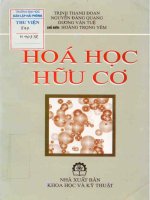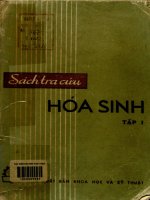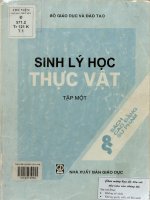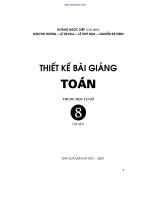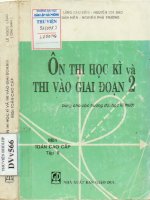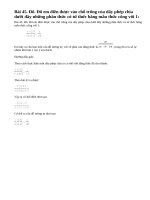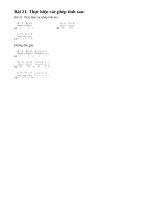SÁCH BÀI TẬP TIẾNG ANH LỚP 6 TẬP 1
Bạn đang xem bản rút gọn của tài liệu. Xem và tải ngay bản đầy đủ của tài liệu tại đây (6.59 MB, 88 trang )
BÀI TẬP
TIẾNG ANH 6
Tập 1
Name:
………………………………………………………………………………………………..
gg
UNIT 1
MY NEW SCHOOL
NEW WORDS
1. activity /ækˈtɪvəti/ (n): hoạt động
2. art /ɑːt/ (n): nghệ thuật
3. bicycle /ˈbaɪsɪkl/ (n): xe đạp
4. backpack /ˈbỉkpỉk/ (n) Ba lơ
5. binder /ˈbaɪndə(r)/ (n) Bìa hồ sơ
6. boarding school /ˈbɔːr.dɪŋ ˌskuːl/ (n): trường nội trú
7. calculator /ˈkỉlkjuleɪtə(r)/ (n): máy tính
8. classmate /ˈklɑːsmeɪt/ (n): bạn học
9. compass /ˈkʌmpəs/ (n): com-pa
10. creative /kriˈeɪtɪv/ (adj): sáng tạo
11. diploma /dɪˈpləʊmə/ (n) Bằng, giấy khen
12. equipment /ɪˈkwɪpmənt/ : (n) thiết bị
13. excited /ɪkˈsaɪtɪd/ (adj): phấn chấn, phấn khích 14. folder /ˈfəʊldə(r)/ (n) Bìa đựng tài liệu
15. greenhouse /ˈɡriːnhaʊs/ (n): nhà kính
16. help /help/ (n, v): giúp đỡ, trợ giúp
17. ink bottle /ɪηk’bɒtl/ (n) Lọ mực
18. international /ˌɪntəˈnæʃnəl/ (adj): quốc tế
19. interview /ˈɪntəvjuː/ (n, v): phỏng vấn
20. judo /ˈdʒuːdəʊ/ (n): môn võ judo
21. knock /nɒk/ (v): gõ (cửa)
22. locker /ˈlɒkə(r)/ (n) Tủ có khóa
23. mechanical pencil /mə’kỉnɪkl’pensl/ (n): Bút chì kim
24. notebook /ˈnəʊtbʊk/ (n): vở
25. overseas /ˌəʊvəˈsiːz/ (n, adj) (ở): nước ngoài
26. pencil case /ˈpen.səl ˌkeɪs/ (n): hộp bút
27. pencil sharpener /ˈpen·səl ˌʃɑr·pə·nər/ (n):gọt bút chì
28. pocket money /ˈpɑː.kɪt ˌmʌn.i/ (n): tiền túi, tiền riêng
29. poem /ˈpəʊɪm/ (n): bài thơ
30. private tutor /praivət’tju:tə(r)/ (n) Gia sư riêng
31. remember /rɪˈmembə(r)/ (v): nhớ, ghi nhớ
32. rubber /ˈrʌbə(r)/ (n): cục tẩy
33. ruler /ˈruːlə(r)/ (n): thước
34. school bag /ˈskuːl.bæɡ/ (n): cặp đi học
35. school supply /’sku:l sə’plaɪ/ (n) Dụng cụ học tập
36. share /ʃeə(r)/ (n, v): chia sẻ
37. smart /smɑːt/ (adj): bảnh bao, sáng sủa, thông minh
38. surround /səˈraʊnd/ (v): bao quanh
39. swimming pool /ˈswɪm.ɪŋ ˌpuːl/ (n): hồ bơi
40. textbook /ˈtekstbʊk/ (n): sách giáo khoa
A. PHONETICS
giaoa
I. Put the words into the correct column depending on the sound of the letter(s) in bold.
mother, wonderful, judo, money, go, come, notebook, hungry, borrow, rubber, homework,
video, brother, month, some, rode, club, hope, post, compass, home, lunch, Sunday, love,
study, subject, overseas, lower, open, country
1
…………………………….………………………………………….………………………………………….……………
/әʊ/
…………………………….………………………………………….………………………………………….……………
…………………………….………………………………………….………………………………………….……………\
/ʌ/
…………………………….………………………………………….………………………………………….……………
II. Circle the word that has the underlined part pronounced differently.
1. A. money
B. sorry
C. morning
D. story
2. A. now
B. grow
C. down
D. town
3. A. study
B. student
C. studio
D. stupid
4. A. house
B. about
C. hour
D. country
5. A. lunch
B. fun
C. judo
D. sun
B. VOCABULARY AND GRAMMAR
I. Complete the words and match.
1. p_ _c_l c_ _e
2. r_l_r
3. b_c_c_e
4. _u_b_r
5. c_m_a_s
6. c_l_u_at_r
7. s_ _o_ _b_g
8. t_ _tb_ _k
9. pen
10. di_t_o_ ar_
11. n_ t _ b_o_
12. p_n_i_s_a_p_n_r
II. Write school subiects.
geography science
maths
art
biology
English
literature
history
physics
PE (physical education)
1. …………………………….………………..
2. …………………………….………………..
2
3. …………………………….………………..
4. …………………………….………………..
5 …………………………….………………..
5.
…………………………….………………..
6. ………………………
7. …………………………….………………..
8 …………………………….………………..
8.
9. ………………………
…………………………….………………..
III. Look at the pictures and name the activities.
1. reading
2 …………………………….………………..
2.
3. …………………………….………………..
4. …………………………….………………..
5 …………………………….………………..
5.
6. …………………………….………………..
7. …………………………….……………….. 8.
8 …………………………….………………..
IV. Complete the sentences with the words from the box.
uniforms
boarding
library
classmates
equipment
excited
international
creative
1. Vy and Phong are ………………………….……………… about their first day at secondary school.
2. Phong and Duy are in the same class at school. They are ………………………….……………….
3. Most schools require children to wear school ………………………….……………….
4. My sister is very ………….………………. She is very good at painting pictures ……………….……………….
5. A …………….………………school is a school where students study and live during the school year.
3
6. AIS is an ………………………….……………… school in Vietnam. It provides American education.
7. The school gym has lots of new, modern ………………………….……………….
8. In the ……………….………………, you can read books and papers or borrow them to read at home.
V. Put the words into the right column.
music
lessons
English
breakfast
judo football
aerobics
housework
vocabulary
homework
exercise
history lunch
the piano
sports science drawings badminton subjects
paintings
dinner
play
the violin
do
basketball
geography
English lesson
karate
have
maths
study
…………………………………………………..
.
…………………………………………………..
.
…………………………………………………..
.
…………………………………………………..
.
…………………………………………………..
.
…………………………………………………..
.
…………………………………………………..
.
…………………………………………………..
.
…………………………………………………..
.
…………………………………………………..
.
…………………………………………………..
.
…………………………………………………..
.
…………………………………………………..
.
…………………………………………………..
.
…………………………………………………..
.
…………………………………………………..
.
VI. Fill the gaps with the correct prepositions.
1. The children are excited ………………………….……………… the school trip.
2. Dorothy put ………………………….……………… her coat and went out.
3. We have English, maths and science ………………………….……………… Tuesday.
4. What do you usually do ………………………….……………… break time?
5.
………………………….………………
the afternoon I play footballthe playground.
6. I go home ………………………….……………… 4 o’clock every day.
7. Vy is doing her homework ………………………….……………… the library.
8. Many boarders go home ………………………….……………… weekends.
VII. Put the verbs into the correct form. Use Present Simple.
1. They ………………………….……………… (play) football and basketball at school.
2. My father ………………………….……………… (read) the newspaper every morning.
3. We ………………………….……………… (have) English, Maths and Science on Monday.
4. She never ………………………….………………(do) her homework.
5. I ………………………….……………… (go) swimming twice a week.
6. Cars ………………………….……………… (be) more expensive than motorbikes.
7. Jane always ………………………….……………… (have) breakfast at 6 o’clock.
8 He usually ………………………….……………… (watch) TV after dinner.
9. London ………………………….……………… (be) a very big country.
4
10. I ……………………….……………… (be) a student and my parents …………………………………… (be) teachers.
VIII. Write negative sentences. Use short forms.
1. I’m the best in the class. →
. ………………………….………………
2. Mark does homework in the evening. →
. ………………………….………………
3. We play football after school. →
. ………………………….………………
4. You run fast.
. ………………………….………………
→
5. Tim and Lucas work at weekends. →
. ………………………….………………
6. I like classical music. →
. ………………………….………………
7. These exercises are difficult. →
. ………………………….………………
8. She has science on Fridays. →
. ………………………….………………
IX. Make questions in the present simple. Then write short answers.
1. you/ have/ an art lesson on Monday (no)
- ………………………….………………………………………….…………………………………………………………………….……………………?
2. they/ ride/ their bikes to school (yes)
- ………………………….………………………………………….…………………………………………………………………….……………………?
3. Jane/ play/ tennis at school (no)
- ………………………….………………………………………….…………………………………………………………………….……………………?
4. your parents/ at home now (yes)
- ………………………….………………………………………….…………………………………………………………………….……………………?
5. he/ have/ breakfast at 6 o’clock every day (yes)
- ………………………….………………………………………….…………………………………………………………………….……………………?
6. you/ a good student (no)
- ………………………….………………………………………….…………………………………………………………………….……………………?
7. I/ look/ well (no)
- ………………………….………………………………………….…………………………………………………………………….……………………?
8. Ms. Van/ a good teacher (yes)
- ………………………….………………………………………….…………………………………………………………………….……………………?
X. Use the prompts to write full sentences. Use Present Continuous.
1. I/ do my homework
→………………………….………………………………………………………………………………………………………………………………….……
2. Bella/ talk on the phone
→………………………….………………………………………………………………………………………………………………………………….……
3. We/ listen to CDs now
5
→………………………….………………………………………………………………………………………………………………………………….……
4. The children/ ride to the park
→………………………….………………………………………………………………………………………………………………………………….……
5. It/ rain very hard now
→………………………….………………………………………………………………………………………………………………………………….……
6. She/ bake a chocolate cake
→………………………….………………………………………………………………………………………………………………………………….……
7. You/ dance very beautifully
→………………………….………………………………………………………………………………………………………………………………….……
8. Mark and his friends/ have lunch
→………………………….………………………………………………………………………………………………………………………………….……
XI. Complete the sentence with the negative form of the present continuous.
1. They ……………………………………………… (help) the teacher right now.
2. She ……………………………………………… (stay) in a hotel.
3. I ……………………………………………… (travel) a lot these days.
4. We ……………………………………………… (study) science at present.
5. The children ……………………………………………… (play) football in the playground.
6. Bob ……………………………………………… (watch) the news on TV.
7. My parents ……………………………………………… (talk) to the teacher at the moment.
8. The sun ……………………………………………… (shine) today.
XII. Complete the sentence with the present simple or present progressive form of the verb
1. I ……………………………………………… (look) for Jack. Do you know where he is?
2. You ……………………………………………… (know) a lot about computers.
3. They ……………………………………………… (do) maths homework now.
4. Mark often ……………………………………………… (play) tennis at the weekend.
5. Just a minute, I can’t hear you. I ……………………………………………… (listen) to the radio.
6. Bob ……………………………………………… (watch) the news on TV every morning.
7. Be quiet! The children ……………………………………………… (study) in the room.
8. Mark ……………………………………………… (not do) homework on Saturdays.
9. Wake up! The teacher ……………………………………………… (ask) you a question.
10. We ……………………………………………… (not work) at the moment. We’re on a break.
XIII. Complete the sentences with the question words.
what
when
where how
who
how often
6
how many
how much
1.
…………………………………………
does the first lesson begin? - At seven o’clock.
2.
…………………………………………
3.
…………………………………………
4.
…………………………………………
5.
…………………………………………
6.
…………………………………………
7.
…………………………………………
8.
…………………………………………
9.
…………………………………………
are you going? - To the library.
do you usually bring to school? - Textbooks, notebooks and pens.
do you go to school? - By bike.
is Mary talking to? - Mrs. Berry, her English teacher.
is your favorite subject? - Maths.
is your first day at school? - Oh, it’s great.
does Phong do judo? - Three times a week.
students are there in your class? - Forty.
10. …………………………………………pocket money do you get? - Ten thousand dong.
C. SPEAKING
I. Write questions for the underlined words.
1. Duy: …………………………………………………………………………………………………………………………………………………….
Mai:
On Friday I have English, maths, geography and history.
2. Nga: …………………………………………………………………………………………………………………………………………………….
Huan:
Phong and Nam are playing football at the moment.
3. Peter: ………………………………………………………………………………………………………………………………………………….
Jane:
My new school has four floors.
4. Susan: ………………………………………………………………………………………………………………………………………………….
Tom:
Sam is having lunch with his new friends.
5. Nam: …………………………………………………………………………………………………………………………………………………….
Hai:
I usually play sports after school.
6. Mai: …………………………………………………………………………………………………………………………………………………….
Tony:
My brother goes to the judo club twice a week.
7. Mary: …………………………………………………………………………………………………………………………………………………….
Janet:
We have Physics on Monday.
8. Quang: ………………………………………………………………………………………………………………………………………………….
Tuan:
They are going to the library.
II. Ask and answer questions, using the given words.
1. you/ usually/ do/ in the evening (do my homework)
→………………………….………………………………………………………………………………………………………………………………….……
→………………………….………………………………………………………………………………………………………………………………….……
2. you/ do/ at the moment (read a book)
7
→………………………….………………………………………………………………………………………………………………………………….……
→………………………….………………………………………………………………………………………………………………………………….……
3. Mai/ live (on Tran Hung Dao Street)
→………………………….………………………………………………………………………………………………………………………………….……
→………………………….………………………………………………………………………………………………………………………………….……
4. Sandra/ talk to on the phone (her mother)
→………………………….………………………………………………………………………………………………………………………………….……
→………………………….………………………………………………………………………………………………………………………………….……
5. you/ like (maths and physics)
→………………………….………………………………………………………………………………………………………………………………….……
→………………………….………………………………………………………………………………………………………………………………….……
6. the children/ play football/ now (in the park)
→………………………….………………………………………………………………………………………………………………………………….……
→………………………….………………………………………………………………………………………………………………………………….……
7. Vy/ often/ do her homework (at 8p.m)
→………………………….………………………………………………………………………………………………………………………………….……
→………………………….………………………………………………………………………………………………………………………………….……
D. READING
I. Read the chart about the qualities of a good classmate and decide true (T) or false (F).
1. A good classmate always tries his/ her best to help and support you.
2. A good classmate will never says “thank you” if you help him/ her.
3. A good classmate will ask you about your health if he/ she sees you after a long time.
4. A good classmate plays with you at break time.
5. A good classmate bullies you sometimes.
8
II. Fill in each gap with a word from the box.
big
grades
elementary
scared
school
teachers
Middle school often includes sixth, seventh, eighth and ninth (1)
calledmiddle school because it’s in the middle of your (2)
Second
still
. It’s
…………………………………………
…………………………………………
years.
Elementary school is behind you. High school (3) ………………………………………… awaits you.
For a kid, going to middle school is often a (4) ……………………………… change: First, it usually means
moving to a new building, which takes some time to adjust to. (5)
, it
…………………………………………
may mean taking a different bus, with different students. Third, the friends you made in (6)
…………………………………………
school may end up going to different middle schools. And other things
that probably will be different are the (7) ………………………………………… and the work. All of that can
make you feel a bit (8)
on the first day of school.
…………………………………………
E. WRITING
I. Put the words in order to make a sentence.
1. secondary/ first/ your/ at/ school/ is/ how/ week?
→………………………….………………………………………………………………………………………………………………………………….……
2. lessons/ many/ have/ on/ how/ you/ do/ Friday?
→………………………….………………………………………………………………………………………………………………………………….……
3. art/ creative/ are/ drawings/ students/ the/ some/ doing/ in/ club
→………………………….………………………………………………………………………………………………………………………………….……
4. school/ at/ English/ we/ have/ classes/ don’t/ today
→………………………….………………………………………………………………………………………………………………………………….……
5. homework/ you/ doing/ maths/ are/ your?
→………………………….………………………………………………………………………………………………………………………………….……
6. children/ first/ on/ most/ school/ excited/ are/ day/ of/ the
→………………………….………………………………………………………………………………………………………………………………….……
II. Complete the second sentence so that it has the same meaning as the first.
1. What is your favorite subject?
→ What subject ………………………………………………………………………………………………………………………………….……
2. There are 35 students in my class.
→ My class ………………………………………………………………………………………………………………………………………….……
3. Mai live near her school.
→ Mai’s house isn’t …………………………………………………………………………………………………………………………………
4. Mary plays the piano very well.
9
→ Mary is good ………………………………………………………………………………………………………………………………….……
5. Do you like physics?
→ Are you interested ………………………………………………………………………………………………………………………………
6. The school has a computer room and a library.
→ There ………………………………………………………………………………………………………………………………….………………….
TEST FOR UNIT1
I. Choose the word whose underlined part is pronounced differently from the others.
1. a. uniform
b. computer
c. student
d. judo
2. a. subject
b. sure
c. surround
d. see
3. a. excited
b. nice
c. library
d. living
4. a. school
b. teacher
c. cheap
d. watching
5. a. teach
b. speak
c. break
d. read
II. Look at the picture and fill in the gap with a suitable word.
1. You can use a ………………………………………… to look up a new word.
2. You can use a ………………………………………… to do calculations.
3. You can use a ………………………………………… to write notes.
4. You can use a ………………………………………… to carry books, pens, etc. to
school.
5. You can use a ………………………………… to remove pencil marks from paper.
6. You can use a ………………………………………… to carry pencils, pens, rulers,
rubbers, etc.
7. You can use a ………………………………………… to draw circles.
8. You can use a ………………………………………… to draw straight lines.
III. Choose the best answer a, b, c or d to complete the sentence.
1. How is your first week _________ school?
a. on
b. at
c. for
2. My brother often helps me_________ my homework.
10
d. to
a. at
b. about
c. for
d. with
3. Megan is_________ badminton with her friends in the schoolyard.
a. having
b. studying
c. playing
d. doing
c. covered
d. grounded
4. The villa is_________by pine trees.
a. surrounded
b. built
5. We do_________ in the gym every afternoon.
a. table tennis
b. football
c. judo
d. homework
6. _________ does Jane have science?~ On Monday and Friday.
a. Where
b. What
c. When
d. What time
7. Nowadays, students often use_________ in mathematics lessons.
a. rubbers
b. calculators c. pencils
d. dictionaries
8. My cousin goes to a_________ school, so she only comes home at weekends.
a. boarding
b. private
c. public
d. international
9. You look really_________ in your new uniform!
a. excited
b. smart
c. healthy
d. interesting
10. _________ your parents give you pocket money?
a. Is
b. Are
c. Do d. Does
IV. Complete the sentence with the correct form of the verb.
1. Children often ……………………………………………… (use) a computer for school work.
2.
………………………………………………
(Jane/ watch) TV now?
3. Mark……………………………………………… (not go) to school on Friday afternoon.
4. Look! The cat……………………………………………… (eat) your breakfast.
5.
(you/ study) IT at school?
………………………………………………
6. I……………………………………………… (not listen) to music, I
………………………………………………
(play) a
computer gam eat the moment.
7. Put on a raincoat. It……………………………… (rain). It…………………………………… (rain) a lot in summer.
8. Where are the children? ~ They ……………………………………………… (read) books in the library.
V. Find and correct the mistakes.
1. My father works at the moment.
Is reading
2. I am often playing football on Saturdays.
………………………………………………
3. She iswanting to buy a new computer.
………………………………………………
4. My children doesn’t like reading.
………………………………………………
5. We have breakfast now.
………………………………………………
11
6. The girls are skip in the playground.
………………………………………………
7. Ann gets up at 6 o’clock and is having breakfast every day.
8. I’m sorry I don’t have time. I cook dinner.
……………………………………
………………………………………………
VI. Match the questions with the answers.
____ 1. Who are you waiting for?
a. No, they are sleeping.
____ 2. What do you do at break time?
b. By bicycle.
____ 3. Where are you going?
c. To buy some bread.
____ 4. Do you play sports after school? d. My friends.
____ 5. Are they watching television?
e. Five days a week.
____ 6. Why is he going out?
f. Home.
____ 7. How often do you go to school?
g. Yes, I do.
____ 8. How do you go to school?
h. I go out and play in the playground.
VII. Choose the word which best fits each gap.
My dream school is a quiet school (1) …………………… wehave just two or three hours a day, in
the morning. Then, inthe afternoon, we can do many (2)
……………………
like singing, dancing,
playing soccer, basketball, rugby. We won’t havetests and mark either. The teachers will not (3)
……………………
homework, so we can do whatever we want after school. In my dream school, we
can also choose the (4)
……………………
we want: for example, you’re not going to learn
mathematics or physics if you hate (5)……………………. So it’s a free school where you can learn
with calm and serenity and you can make (6) …………………… friends during afternoon activities!
1.
a. what
b. where
c. when
d. how
2.
a. subjects
b. actions
c. activities
d. acts
3.
a. give
b. take
d. do
d. get
4.
a. class
b. classrooms
c. classmates
d. classes
5.
a. it
b. them
c. her
d. him
6.
a. much
b. few
c. any
d. lots of
VIII. Read and answer questions.
Hi, I’m Linda. I’m in the sixth grade. Today is my first day at secondary school. In the
morning I put on my new uniform and get my new bag.
My best friend and I walk to school together. We are both very nervous and excited. When
we get school, we are shown into our classroom with our new teacher. It is quite scary because
I don’t know most of the children. Then we go to our first lesson. We have lots of different
subjects and the lessons are really fun. My favourite subjects are art and English. I really like
12
my new school, all my teacher are lovely, the lessons are reallyinteresting and I enjoy my first
day. I can’t wait to go back tomorrow!
1. What grade is Linda in?
→………………………….………………………………………………………………………………………………………………………………….……
2. Who does she go to school with?
→………………………….………………………………………………………………………………………………………………………………….……
3. How does they go to school?
→………………………….………………………………………………………………………………………………………………………………….……
4. Why does Linda feel scary?
→………………………….………………………………………………………………………………………………………………………………….……
5. What are her favourite subjects?
→………………………….………………………………………………………………………………………………………………………………….……
6. Does she enjoy her first day at school?
→………………………….………………………………………………………………………………………………………………………………….……
IX. Make sentences, using the words and phrases given.
1. This/the first week/my new school
→………………………….………………………………………………………………………………………………………………………………….……
2. My new school/ big/ and it/ a large library
→………………………….………………………………………………………………………………………………………………………………….……
3. I/ usually/ my homework/ the school library
→………………………….………………………………………………………………………………………………………………………………….……
4. I/ lots of friends/ and they/ all nice/ me
→………………………….………………………………………………………………………………………………………………………………….……
5. We/ many subjects/ and my favorite subject/ science
→………………………….………………………………………………………………………………………………………………………………….……
6. In the afternoon/ I/ sports/ the playground
→………………………….………………………………………………………………………………………………………………………………….……
7. My friends and I/ basketball/ at the moment
→………………………….………………………………………………………………………………………………………………………………….……
13
UNIT 2
MY HOME
A. PHONETICS
I. Put the words into the correct column depending on how the ending is pronounced.
rooms
houses
dogs
toilets
beds
apartments books chairs televisions boxes
pictures
baths
dishes
fridgescookers
chopsticks
lights
vases
photos
parents
wishes
sandwiches attics
plants
walls tablecloths
shelves
classes
clothes
/z/
lamps
tables
windows
villas
tourists
/s/
/iz/
…………………………….………………….
.
…………………………….………………….
.
…………………………….………………….
.
…………………………….………………….
.
…………………………….………………….
.
…………………………….………………….
.
…………………………….………………….
.
…………………………….………………….
.
…………………………….………………….
.
…………………………….………………….
.
…………………………….………………….
.
…………………………….………………….
.
…………………………….………………….
.
…………………………….………………….
.
…………………………….………………….
.
II. Circle the word that has the ending pronounced differently.
1. A. boys
B. lessons
C. cats
D. pictures
2. A. places
B. messages
C. houses
D. clothes
3. A. sinks
B. bags
C. laptops
D. students
4. A. fridges
B. kisses
C. watches
D. wardrobes
5. A. plates
B. posters
C. trees
D. songs
B. VOCABULARY AND GRAMMAR
I. Write the types of house in the spaces.
1. a………………………….…………… large house in the countryside
2. ………………………….……………a set of rooms for living in, usually on one
floor of a building
3.
a large and luxurious house with a large
………………………….……………
yard and garden
14
4. ………………………….……………
a terraced house in a city or town
……………………
5. ………………………….……………
a house
ouse built on piles above the ground or
……………………
water
II. Parts of the house. Unscramble the letters, then complete the passage.
1. ergnad
………………………….
…….……………
5. nviligomor
………………………….
…….……………
2. amrhoobt
………………………….
…….……………
6. gnidinrmoo
………………………….
…….……………
3. moordeb
………………………….
…….……………
7. citta
………………………….
…….……………
4. hcnekit
………………………….
…….……………
8. ragega
………………………….
…….……………
I like my big house. It has got two (1) ………………………….…………… upstairs, my parents’ one and
mine. Upstairs also there is a (2) ………………………….……………
where I wash and brush my teeth.
……………………
Downstairs there is a big (3) …………………….……………
where my mother cooks and prepares m
meals,
……………………
…………… where we
a (4) ………………………….…………… to eat altogether and a (5) ………………………….……………
watch TV or sit and relax. Outdoors my parents park their cars in the (6) ……………………
……………………….……………,
and we have a beautiful (7) ………………………….……………
with a lot of flowers and trees. My house
……………………
…………… where we store lots of old things.
also has an (8) ………………………….……………
III. Write the name of each item under the correct picture.
bath
dishwasher
chest of drawers microwave
wardrobe
sofa
cooker
air conditioner
sink
fridge
1. ……………………………………………
2. ……………………………………………
3. ……………………………………………
4. ……………………………………………
5. ……………………………………………
6. ……………………………………………
15
7. ……………………………………………
8. ……………………………………………
9. ……………………………………………
IV. Complete the sentence with the correct preposition in, on or at.
1. I’ve got a computer …………………………………………… my bedroom.
2. Do you live …………………………………………… a house or an apartment?
3. He is sitting ……………………………… a sofa …………………………………… the corner of the sitting ro
room.
4. There is such a mess …………………………………………… the kitchen!
5. The dog is sleeping …………………………………………… the carpet.
6. We live …………………… the 3rd floor ………………………… 53 Pine Street ………………………… London.
7. Jane is waiting for a bus …………………………………………… the bus stop.
8. Are there any pictures ………………………………… the walls ………………………………… the living room?
9. We are staying ……………………………… the Roosevelt Hotel …………………………………… New York City.
10. My camera is ………………… a box …………………… a shelf ……………………………… the bedroom closet.
V. Look at the picture.
icture. Complete the sentences with the correct prepositions from the box.
near
above under
in (3)
on (3)
next to (2)
between
behind
1. The trees are …………………………………………… the house.
2. The dining room is …………………………………………… the
living room and the kitchen.
3. The kitchen sink is ………………………………… the window.
4. The bath is …………………………………………… the bathroom.
5. The flower vase is …………………………………………… the
chest of drawers.
6. The fridge is …………………………………………… the cooker.
7. The mirror is …………………………………………… the bathroom sink.
8. The television is …………………………………………… the cupboard …………………………………………… the sofa.
9. The microwave is …………………………………… the counter …………………………………………the kitchen.
10. The washing machine is …………………………………… the dryer ………………………………… the basement.
VI. Underline the correct preposition.
1. Don’t sit in/ on/ under this stool. It’s broken.
16
2. My grandma is sitting in/ on/at the armchair on/ next/ beside the fireplace.
3. Simon likes to stayin/ on/ at bed all Sunday morning.
4. We live on/ in/ at an apartment on/at/ into a very busy road.
5. I put my book in/ on/ over the table in/ at/ on the dining room.
6. There is a clock under/ next to/ above the teacher’s desk.
7. He always hides the key on/at/under the doormat.
8. Mary is sitting under/ between/ behind her parents. They are watching TV.
9. On a bus, passengers sit in front of/ behind/ between the driver.
10. You can see children’s books in/ on/ at the bookshelf to/ at/ in the comer.
VII. Complete the sentences with There is or There are.
1.
……………………………………………
25 students in the class.
2.
……………………………………………
3
……………………………………………
4
……………………………………………
5.
……………………………………………
6.
……………………………………………
7.
……………………………………………
8.
……………………………………………
a big wardrobe in my sister’s room.
a computer and a TV in my room.
good programs on television.
some furniture in my bedroom.
four eggs in the fridge.
a lot of water in the bottle.
no paper in the printer.
VIII. Complete the questions with Isthere or Are there. Then write short answers.
1.
……………………………………………
many shops in your town? Yes, …………………………………………….
2.
……………………………………………
3.
……………………………………………
4.
……………………………………………
5.
……………………………………………
6.
……………………………………………
7.
……………………………………………
8.
……………………………………………
a post office near here? No, …………………………………………….
a table and chairs in the kitchen? Yes, …………………………………………….
any trees in your garden? No, …………………………………………….
a book under the table? Yes, …………………………………………….
any girls in the class? Yes, …………………………………………….
any coffee in the cup? No, …………………………………………….
a lot of children in the yard? No, ……………………………………………. .
IX. Use the words to write positive (+) and negative (-) sentences and questions (?) with
there is / there are.
1. a bath in the bathroom (?)
Is there a bath in the bathroom?
2. some shops near our new house (+)
………………………………………………………………………………
3. a school in the neighbourhood (?)
………………………………………………………………………………
4. a television in my bedroom (-)
………………………………………………………………………………
17
5. any cupboards in the dining room (?)
………………………………………………………………………………
6. a swimming pool behind the house (+)
………………………………………………………………………………
7. any flowers in the garden (-)
………………………………………………………………………………
8. a lot of posters on the wall (+)
………………………………………………………………………………
X. Look of the picture and write positive or negative sentences. Use There is/ There isn’t/
There are/ There aren’t and the appropriate prepositions.
1. a bed/ the bedroom
………………………………………………………………………………
2. two pillows/ the bed
………………………………………………………………………………
_
3. a window/ the picture and the shelf
………………………………………………………………………………
_
4. books/ the shelf
………………………………………………………………………………
5. clothes/ the wardrobe
………………………………………………………………………………
6. a clock/ the wall
………………………………………………………………………………
7. a toy box/ the bed
………………………………………………………………………………
8. toys/ the floor
………………………………………………………………………………
9. a bedside table/ the bed
………………………………………………………………………………
_
10. a vase of flowers/the bedside table
………………………………………………………………………………
_
_
XI. Put the verbs into the correct tenses.
1. It ……………………………………………… (snow) quite hard – perhaps we shouldn’t go out tonight.
2. My mother ……………………………………………… (not like) buying food in supermarkets.
3. Sorry, I’m busy at the moment. I ……………………………………………… (do) my homework.
4. Sue ……………………………………………… (not listen) to music in her room now. She’s outside.
5. They ……………………………………………… (not eat) meat on Fridays.
6. The teacher ……………………………………………… (often/ give) us a lot of homework.
7. How often ……………………………………………… (you/ go) to the gym to work out?
8. Listen! What language ……………………………………………… (they/ speak)?
9. We usually
………………………………………………………
………………………………………………
(go) by car.
18
(take) a bus to school, but this week we
10. Helen and Toro ……………………………………………… (not wait) for the bus at the moment.
C. SPEAKING
I. Write the questions to complete the conversation.
Hanh: (1) ………………………………………………………………………………………………, Paul?
Paul: I live in Brookline, Massachusetts.
Hanh: (2) ………………………………………………………………………………………………?
Paul: No, I don’t live in a house. I live in an apartment.
Hanh: (3) ………………………………………………………………………………………………?
Paul: No, it isn’t. My apartment is small but very comfortable.
Hanh: (4) ………………………………………………………………………………………………?
Paul: There are two bedrooms.
Hanh: (5) ………………………………………………………………………………………………?
Paul: Yes, there are two bathrooms.
Hanh: (6) ………………………………………………………………………………………………?
Paul: No, there isn’t a dining room. The kitchen is quite large so we eat meals in the
kitchen.
Hanh: (7) ………………………………………………………………………………………………
?
Paul: My favourite room is my bedroom.
Hanh: (8) ………………………………………………………………………………………………
?
Paul: There is a bed, a wardrobe, a table, a chair and a bookcase in my room.
III. Tell about your house or apartment.
Teacher: Do you live in a house or an apartment?
You: ……………………………………………………………………………………………………………………………………………… (1)
Teacher: Where is your house/ apartment?
You: ……………………………………………………………………………………………………………………………………………(2)
Teacher: Is it big or small?
You: ………………………………………………………………………………………………………………………………………………(3)
Teacher: How many rooms are there in your house/ apartment?
You: ………………………………………………………………………………………………………………………………………………(4)
Teacher: What colour is your bedroom?
You: ………………………………………………………………………………………………………………………………………………(5)
Teacher: What is there in your bedroom?
You: ………………………………………………………………………………………………………………………………………………(6)
19
D. READING
I. Fill in each gap with a word from the box.
stand
music
curtain
bookshelf
next
rug
favourite
there
My (1) ……………………………………………… room is our living room. It is rather big and warm. There
is a big window with lots of pot plants and green and yellow (2) ………………………………………………. In
our living room, (3)……………………………………………… is a green sofa and two green armchairs. There
is a big yellow (4)
………………………………………………
………………………………………………
on the floor. A modern floor light (5)
in the right corner of the room. (6 )
………………………………………………
to
the sofa there is a small coffee table with a vase of flowers. By the wall there is a big table with
six brown chairs. We have a television and a (7) ……………………………………………… with a lot of books
and pictures. We also have a CD player on the shelf.
I often watch TV, listen to (8)
………………………………………………
or read books there. I really like
my living room.
II. Read the passage and then decide if the statements are true (T) or false (F).
I live in a house near the sea. It’s an old house, about 100 years
old, and it’s very small. There are two bedrooms upstairs but no
bathroom. The bathroom is downstairs next to the kitchen and
there’s a living room where there’s a lovely old fireplace. There’s a
garden in front of the house. The garden goes down to the beach
and in spring and summer there are flowers everywhere. I live with my parents, and we have a
lot of visitors. My city friends often stay with me. I love my house for many reasons: the
garden, the flowers in summer, the fire in winter, but the best thing is the view from my
bedroom window.
1. The author lives in the seaside.
2. There is no bathroom in her house.
3. The house has got two floors and four rooms.
4. There are flowers in the garden in front of the house.
5. Her family rarely has visitors.
6. The author likes her bedroom’s window view best.
E. WRITING
I. Complete the second sentence so that it means the same as the first.
1. My house has got five rooms.
20
→ There ………………………………………………………………………………………………………………………………………………
2. The bus station isn’t far from the new shopping center.
→ The bus station is ……………………………………………………………………………………………………………………………
3. There isn’t a telephone in the living room.
→ We ……………………………………………………………………………………………………………………………………………………..
4. The house is behind the trees.
→ There are trees …………………………………………………………………………………………………………………………………
5. There are only a few biscuits in the packet.
→ There aren’t …………………………………………………………………………………………………………………………………………
6. There are two bathrooms in that house.
→ That house ……………………………………………………………………………………………………………………………………………
7. I like the kitchen most.
→ My favourite ………………………………………………………………………………………………………………………………………
8. Is there a garden in front of the house?
→ Does the house ……………………………………………………………………………………………………………………………………
II. Describe your house or apartment. Answer these questions, then write a text.
1. Do you live in a house or an apartment?
2. Where is it? (a city, a town, a country or a village)
3. Who do you live with?
5. What are they?
4. How many rooms are there in your house/ apartment?
6. Is there a garden?
7. Are the neighbours nice/ friendly/ noisy...? 8. Do you like your house/ apartment?
I live in a/ an ___________________________________________________________________________
____________________________________________________________________________
____________________________________________________________________________
____________________________________________________________________________
____________________________________________________________________________
____________________________________________________________________________
____________________________________________________________________________
TEST FOR UNIT 2 1
I. Choose the word whose underlined part is pronounced differently from the others.
1. a. light
b. fridge
c. sink
21
d. kitchen
2. a. lamps
b. windows
c. desks
d. plants
3. a. look
b. cook
c. book
d. room
4. a. poster
b. chopstick
c. sofa
d. wardrobe
5. a. honey
b. house
c. hour
d. hotel
II. Which is the odd one out?
1. a. armchair
b. coach
c. sofa
d. cupboard
2. a. bedroom
b. garden
c. kitchen
d. living room
3. a. wardrobe
b. cooker
c. dishwasher
d. fridge
4. a. apartment
b. house
c. attic
d. villa
5. a. bath
b. shower
c. mirror
d. bed
III. Put the words into the correct groups.
bathroom
lamp town
house
sofa
wardrobe
dishwasher dining room stilt house bed
apartment
shelf
microwave
villa kitchen
chest of drawers
bedroom air-conditioner country house living room fridge
Types of building
Rooms
Furniture
Equipment
…………………………………..
.
…………………………………..
.
…………………………………..
.
…………………………………..
.
…………………………………..
.
…………………………………..
.
…………………………………..
.
…………………………………..
.
…………………………………..
.
…………………………………..
.
…………………………………..
.
…………………………………..
.
…………………………………..
.
…………………………………..
.
…………………………………..
.
…………………………………..
.
…………………………………..
.
…………………………………..
.
…………………………………..
.
…………………………………..
.
IV. Choose the best answer a, b, c or d to complete the sentence.
1. Don’t stand ________ the TV I’m trying to watch this programme.
a.behind
b. next to
c. under
d. in front of
2. You should never stand ________ a tree when it is raining,
a.at
b. under
c. between
d. on
3. My mother is in the ________ baking a cake for my birthday.
а. bathroom
b. dinning room
c. kitchen
d. bedroom
4. Please turn the ________ on. It’s so hot in here.
a.fan
b. light
c. television
d. faucet
5. The Tay and Nung people mostly live in ________ made of wood and bamboo.
a. apartments
b. stilt houses
c. town houses
d. villas
6. In our dining room, ______ four chairs and a table. We have breakfast there every morning.
22
a. there is
b. there are
c. there isn’t
d. there aren’t
7. ________ any children in the playground right now.
a. There is
b. There are
c. There aren’t
d. There isn’t
8. I like my bedroom best. It’s my ________ room.
a. beautiful
b. comfortable
c. wonderful
d. favourite
9. My room is so ________! Dirty clothes, toys, books are all over the floor!
a. messy
b. crazy
c. tidy
d. cozy
10. ‘Where do you live?’‘________’
a. On the floor.
b. In the kitchen.
c. In a town house. d. Next to the bookshelf.
V. Put the verbs into the correct tense form.
1. I don’t like the garden in winter time. There ……………………………………………… (be) any flowers.
2. There ……………………………………………… (be) some new furniture in the living room.
3.
………………………………………………
(you/ get) up early in the morning?
4. The students ………………………………………… (not prepare) for the science exam at the moment.
5.
………………………………………………
(there/ be) a student called Andrea in this class?
б. Listen! Someone ……………………………… (play) the guitar. It …………………………………… (sound) great.
7. You ……………………………………………… (look) sad. What’s the matter?
8. What ……………………………………………… (you/ look) for? – My pen.
9. Jack ……………………………………………… (not spend) much time on reading.
10. Susan often
………………………………………………
………………………………………………
(drive) to the beach when the weather
(be) nice.
VI. Supply the correct form of the words in brackets.
1. There are only 20 ………………………………………………in my class. (study)
2. Some
students do drawings and paintings in the art club.
………………………………………………
(create)
3. The class is ………………………………………………; students do not stop talking to each other. (noise)
4. Your room is a ………………………………………………; please pick up your toys. (messy)
5. Every day, students learn English with English ………………………………………………teacher. (speak)
6. In the afternoon, they can join many ………………………………………………clubs. (interest)
7. My house is warm and ………………………………………………. (comfort)
8. Kids are not allowed to use ………………………………………………in math class. (calculate)
9. What is your ………………………………………………room, Tony? (favour)
10. I’m so ………………………………………………about my first day at school. (excite)
23
VII. Match the sentences.
___ 1. Where do you live?
a. Five.
___ 2. Who do you live with?
b. Between the study and the stairs.
___ 3. How many rooms are there?
c. In a town.
___ 4. What’s in the living room?
d. Yes. There’s one next to the window.
___ 5. Where is your room?
e. My bedroom.
___ 6. Is there a television in your room?
f. A sofa set, a television and a lamp.
___ 7. What is your favourite room?
g. My parents and sister.
___ 8. Are there any pictures in the kitchen? h. Yes. There’s a big one on the wall opposite
my bed.
VIII. Look at a famous painting by Van Gogh of his bedroom at Arles.
It is a small room. There is some (1)…………………………… in the room. There is
a bed on the right of the picture. It is a bed for one person. (2)
……………………………
the bed there are some pictures on the wall. Next to the
door, on the left, there is a (3) ……………………………. There is another chair(4)
……………………………
the table and the bed. The table and chair are below the window. On the
table (5) …………………………… some objects - a jug, a glass and a bowl. Next to the door on the right
there is a (6) …………………………… on a peg. Behind the bed there are some more things on the wall
but (7) …………………………… aren’t easy to see. Of course, (8) …………………………… any modern things
in the room and it isn’t very comfortable.
1. a. furniture
b. picture
c. people
d. tool
2. a. On
b. Under
c. Above
d. Behind
3. a. bed
b. chair
c. window
d. table
4. a. between
b. next to
c. beside
d. in front of
5. a. there is
b. there isn’t
c. there aren’t
d. there are
6. a. mirror
b. towel
c. chair
d. picture
7. a. there
b. it
c. they
d. that
8. a. there are
b. there aren’t
c. there is
d. there isn’t
IX. Read the text carefully, then answer the questions.
THIS IS MY HOUSE!
Hello! My name is Peter and this is my house.
My house is quite big. It has got two floors – a ground floor and a first
floor. It has also got an attic and a basement. On the ground floor, there
24
